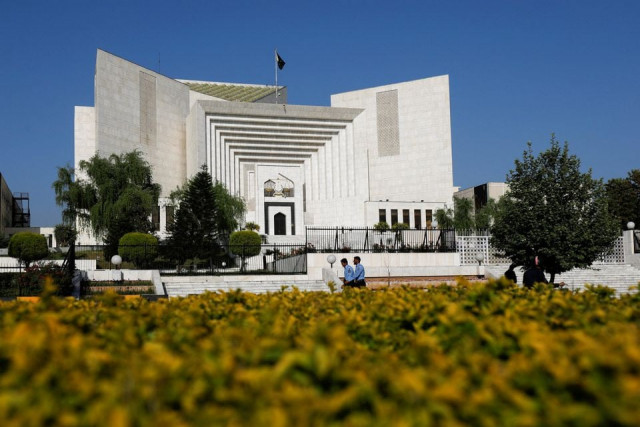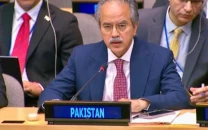SC orders special JIT on journalist’s murder
Fact-finding team report says killing in Kenya was a ‘planned and targeted assassination by transnational characters’

The Supreme Court on Wednesday sought the names of senior and competent officers from the government, who would be part of a special Joint Investigation Team (JIT) to investigate the killing of journalist Arshed Sharif in Kenya.
During the hearing of the suo motu case, a five-judge larger bench led by Chief Justice Umar Ata Bandial also directed the Foreign Office to engage friendly countries as well as international agencies, including the United Nations, for investigation of the case in Kenya.
The chief justice observed that the primary evidences in this matter were in Kenya. He asked Additional Attorney General (AAG) Chaudhry Amir Rehman that officers, who could not be influenced, should be included in the special JIT.
The bench asked mother of Arshad Sharif to record her statement before the investigation team. The chief justice said that investigation team should record her statement but to act in accordance with the law as she was not an eyewitness.
Touching scenes were witnessed, when the mother of the deceased came in the courtroom on a wheelchair. She also came at the rostrum and requested the bench to do justice so no other journalist’s mother could face such grief. She also submitted a three-page statement in which former army chief Gen (retd) Qamar Javed Bajwa and some top military officials were accused of the murder.
At the outset of the hearing, the chief justice said that the report of a fact-finding committee, comprising two senior officers of the Federal Investigation Agency (FIA) and the Intelligence Bureau (IB), was received in Tuesday night.
He asked the AAG Rehman to read the report and assist the bench on Thursday (today).
Interestingly, the bench did not object to the contents of the first information report (FIR) registered by the state the other day. The family of deceased expressed reservations over the FIR lodged against their version. Justice Mazahar Ali Akbar Naqvi, however, wondered why the shooters names were not mentioned in the FIR.
The chief justice appreciated the report of the fact finding committee for unearthing important facts regarding the case. The report said that the murder of Arshad Sharif was a “planned and targeted assassination” by transnational characters and not a case of mistaken identity, as claimed by the police in Kenya.
It added that the “transnational roles” of individuals from Kenya, Dubai, and Pakistan could not be ruled out in the case.
“The four GSU [General Service Unit] police officials and OC GSU Training camp had been used as instruments in this case under influence, either financial or some other compulsion,” it stated.
The report stated that the person, Waqar, who sponsored and hosted the journalist, was connected to Kenya’s National Intelligence Service (NIS) and other international agencies and law-enforcement. “His linkage with national and international agencies provides a scope of possibilities of transnational characters in this case”.
Also, the report said, the narrative of another person, Khurram, who drove the vehicle prior to Sharif’s murder, regarding the sequence of events and the crime scene, were contrary to logic and facts, and that there were no penetration marks of a bullet on Sharif’s car seat.
Rather, the journalist was hit from the back and the bullet exited from the right side of his chest. The report maintained that Khurram’s narrative did not match “his [Sharif’s] sitting position, the position of the gunners as well as the line of fire”.
The report also declared that the Kenyan police’s claims of portraying the incident as a case of “mistaken identity” was also full of contradictions and that the statements given by the GSU police officials contradicted themselves. “Their version of events is not believable”.
It said that the post-mortem in Pakistan identified that four fingernails of the slain journalist’s left hand were missing, adding that the Kenyan post-mortem report did mention “fingernails” taken as DNA samples, but it did not mention how many fingernails were taken.
The report stated that there were “compelling reasons for Arshad Sharif to leave Pakistan due to the criminal cases registered against him in different districts” and added that the journalist was asked to leave the UAE by the Emirati authorities.
The report also highlighted the five principles of international criminal law that invoked the criminal jurisdiction of any country. These principles include the territorial principle, nationality principle, passive personality principle, protection principle, and universal principle.
The report also stated that Deputy Inspector General of Police, Counter-Terrorism Department (CTD), Khyber –Pakhtunkhwa (K-P) had issued a threat alert. The copy of threat alert was circulated to Additional Inspector General CTD, Punjab, but not to Inspector General of Police, Islamabad where Arshad Sharif was residing.
It was also not shared with NACTA as per the SOP regarding major threat alert. “A separate letter to the K-P Provincial Police Officer to verify the authenticity of threat alert issued by CTD but no response was received yet," the report added. Later the hearing was adjourned until Thursday (today).



















COMMENTS
Comments are moderated and generally will be posted if they are on-topic and not abusive.
For more information, please see our Comments FAQ